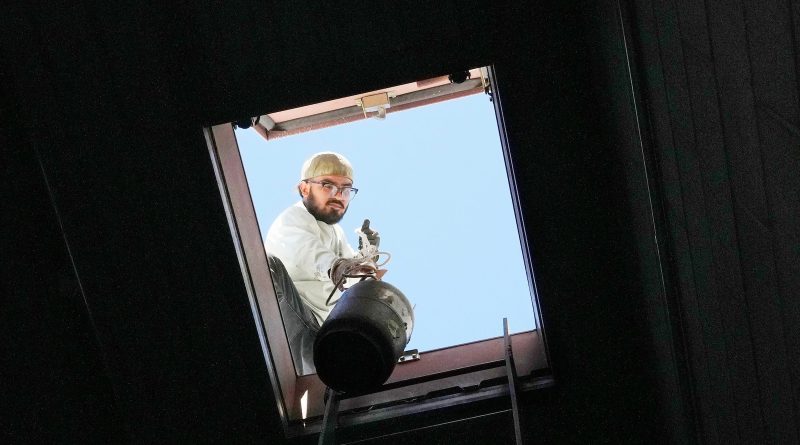The Tragic Impact of Heat-Related Deaths in Unairconditioned Mobile Homes Highlights Energy Inequality
PHOENIX — Mexican farm worker Avelino Vazquez Navarro didn’t have air conditioning in the motor home where he passed away last month in Washington state as temperatures surged into the triple digits.
Over the past twelve years, the 61-year-old spent a significant portion of the year laboring near Pasco, Washington, sending funds to his wife and daughters in the Pacific coast state of Nayarit, Mexico, and returning home every Christmas.
Currently, the family is collecting funds to repatriate his remains.
“If this motor home would have had AC and it was running, then it most likely would have helped,” stated Franklin County Coroner Curtis McGary, who concluded Vazquez Navarro’s passing was heat-related, with alcohol intoxication as a contributing factor.
Most heat-related deaths involve unhoused individuals living outdoors. However, those who perish inside without adequate cooling are also at risk, typically elderly, living independently and with limited income.
Highlighting the disparities around energy and access to air conditioning as summers become hotter, many victims are Black, Indigenous, or Latino, like Vazquez Navarro.
“Air conditioning is not a luxury, it’s a necessity,” expressed Mark Wolfe, executive director of the National Energy Assistance Directors’ Association, which represents state energy assistance programs. “It’s a public health issue and it’s an affordability issue.”
Individuals residing in mobile homes or in aging trailers and RVs are particularly prone to lacking proper cooling. Nearly a quarter of the indoor heat deaths in Arizona’s Maricopa County last year occurred in those types of dwellings, which are transformed into a scorching tin can by the blazing desert sun.
“Mobile homes can really heat up because they don’t always have the best insulation and are often made of metal,” stated Dana Kennedy, AARP director in Arizona, where many heat-related deaths occur.
Studies indicate mobile home residents are particularly at risk in blistering hot Phoenix, where 113-degree Fahrenheit (45 Celsius) weather is predicted for this weekend.
“Individuals are exposed to the elements more than in other housing,” stated Patricia Solís, executive director of the Knowledge Exchange for Resilience at Arizona State University, who collaborated on charting hot weather impacts on mobile home parks for a state preparedness plan.
Moreover, some parks prohibit residents from making adjustments that could cool their homes, citing aesthetic concerns. A recent Arizona law mandated parks for the first time this summer to allow residents to install cooling methods such as window units, shade awnings, and shutters.
In Arizona’s Maricopa County, where Phoenix is located, 156 out of 645 heat-related deaths last year took place indoors in uncooled environments. In most instances, a unit was present but nonfunctional, had no power, or was turned off, according to public health officials.
One casualty was Shirley Marie Kouplen, who passed away after succumbing to high temperatures inside her Phoenix mobile home during a heat wave when the extension cord supplying her electricity was disconnected.
Emergency responders recorded the 70-year-old widow’s body temperature at 107.1 F (41.7 C). Kouplen, who was diabetic and had high blood pressure, was rushed to a hospital, where she passed away.
Kouplen seemed to be struggling financially, as indicated by the poor condition of her mobile home. It remains on Lot 60, enclosed by a chain-link fence with a locked gate and a dirt driveway overgrown with weeds.
It’s uncertain how the cord was disconnected, if Kouplen had a power account, or how she obtained her electricity.
“Losing your air conditioning is now a life-threatening event,” stated Texas A&M University climate scientist Andrew Dessler, who grew up in hot, humid Houston in the 1970s. “You didn’t want to lose your air conditioning, but it wasn’t going to kill you. And now it is.”
Arizona’s regulated utilities have been prohibited since 2022 from disconnecting power during the summer, following the 2018 death of a 72-year-old woman when Arizona Public Service cut off her electricity due to a $51 debt.
Ann Porter, spokesperson for Arizona Public Service, which supplies electricity to homes in the park where Kouplen resided, mentioned “due to privacy concerns” the company could not disclose if she had an account at her time of death or previously. Porter mentioned that the utility refrains from cutting power from June 1 to Oct. 15.
Disconnections can occur after those dates if mounting debts remain unpaid.
Arizona is one of 19 states with shut-off protections, leaving roughly half of the U.S. population without safeguards against losing electricity during the summer, according to a recent study.
Nearly 20% of very-low income families lack air conditioning altogether, especially in regions like Washington state where they were not commonly installed before climate-induced heat waves became more intense, frequent, and prolonged.
In the Pacific Northwest, numerous individuals perished during a 2021 heat wave, prompting Portland, Oregon, to initiate an initiative to supply portable cooling units to vulnerable, low-income individuals.
Chicago, renowned for its frigid winters, experienced a heat wave that claimed 739 lives, mostly elderly individuals, over five days in 1995. Amid high humidity and temperatures exceeding 100 F (37.7 C), most victims lacked air conditioning or could not afford to utilize their units.
In 2022, Chicago implemented a cooling ordinance after three women perished in their apartments in a building for older adults on an unusually warm spring day. Specific residential buildings must now have at least one air conditioned communal area for cooling when the heat index surpasses 80 F (26.6 C) and individual units lack cooling.
Nonprofits in historically warmer regions like Arizona are also striving to better address the disparities low-income individuals face during scorching summers. The Phoenix-based community agency Wildfire recently raised funds to purchase over $

